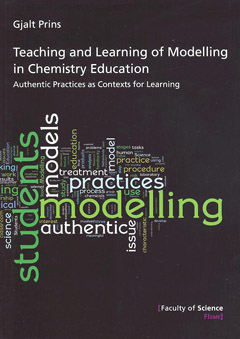 | Teaching and learning of modelling in chemistry education. Authentic practices as contexts for learning FI Scientific Library, nr. 63. Prins, G. T. (2010) 292 pp. |
 | https://www.fisme.science.uu.nl/publicaties/literatuur/2010_thesis_prins.pdf Abstract In science education, students should come to understand the nature and significance of models and the process of modelling. This study explores the potential benefits of using authentic modelling practices as contexts for learning in chemistry education. An authentic modelling practice is characterised as professionals sharing common purposes, working to a similar type of modelling procedure and applying relevant knowledge in the modelling issue they are working on. Using an authentic practice as a context for learning involves the implementation of an essential set of motives and purposes, characteristic procedure and relevant knowledge in curriculum units. In this thesis the results of seven empirical studies on the use of authentic practices as contexts for learning are presented. It was concluded that students enriched their understanding of advanced model features, such as goodness of fit and reliability. In addition, the results show that the majority of the students put forward relevant notions regarding the data-driven modelling approach. An authentic practice is a valuable, rich source of inspiration for designing teaching-learning processes. The educational challenge is to adapt the practices to suit students? abilities and lead to desired learning outcomes. The knowledge base regarding the adaptation of the authentic practice in contexts for learning is described in a design framework, a synthesis of learning phases, instructional functions and design principles. The design framework provides effective heuristic guidelines for structuring the teaching-learning process using authentic practices as contexts for learning models and modelling. |